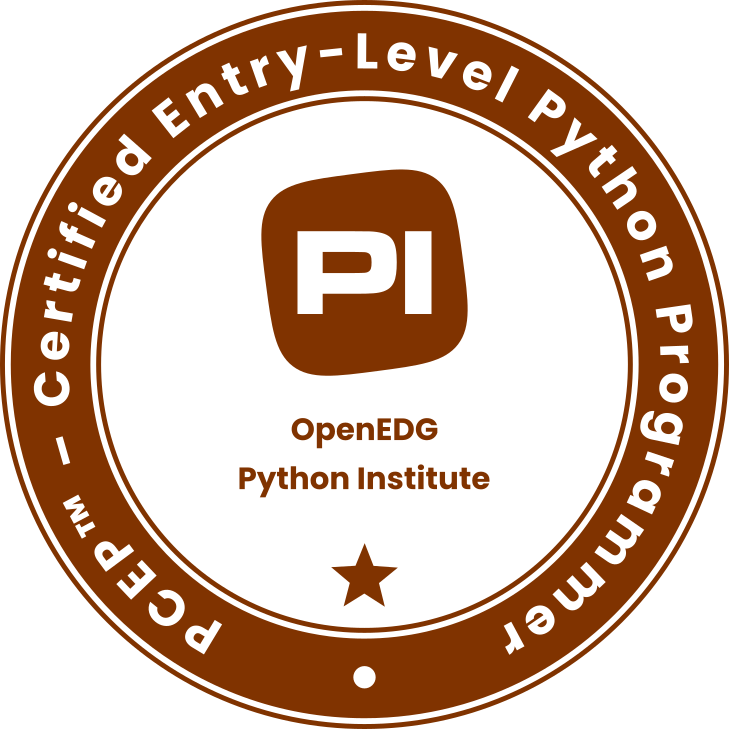
PCEP™ - Certified Entry-Level Python Programmer
Ziele
Diese 5-tägige Schulung bereitet Sie auf die Zertifizierungsprüfung "PCEP™ - Certified Entry-Level Python Programmer" vor. Es deckt grundlegende Konzepte der Python-Programmierung ab, einschließlich Programmiergrundlagen, Kontrollstrukturen, Datensammlungen und einfache Ein-/Ausgabeoperationen. Der Kurs zielt darauf ab, Ihnen ein solides Fundament in Python zu bieten, damit Sie effizient Code schreiben und typische Programmieraufgaben bewältigen können.
Zielgruppe
- Entwickler
Voraussetzungen
- Keine
Lernmethodik
Die Schulung bietet Ihnen eine ausgewogene Mischung aus Theorie und Praxis in einer erstklassigen Lernumgebung. Profitieren Sie vom direkten Austausch mit unseren projekterfahrenen Trainern und anderen Teilnehmern, um Ihren Lernerfolg zu maximieren.
Agenda
Section 1: Computer Programming and Python Fundamentals
-
PCEP-30-02 1.1 – Understand fundamental terms and definitions
- Interpreting and the interpreter, compilation and the compiler
- Lexis, syntax, and semantics
-
PCEP-30-02 1.2 – Understand Python’s logic and structure
- Keywords
- Instructions
- Indentation
- Comments
-
PCEP-30-02 1.3 – Introduce literals and variables into code and use different numeral systems
- Boolean, integers, floating-point numbers
- Scientific notation
- Strings
- Binary, octal, decimal, and hexadecimal numeral systems
- Variables
- Naming conventions
- Implementing PEP-8 recommendations
-
PCEP-30-02 1.4 – Choose operators and data types adequate to the problem
- Numeric operators: ** * / % // + –
- String operators: * +
- Assignment and shortcut operators
- Unary and binary operators
- Priorities and binding
- Bitwise operators: ~ & ^ | << >>
- Boolean operators: not, and, or
- Boolean expressions
- Relational operators ( == != > >= < <= )
- The accuracy of floating-point numbers
- Type casting
-
PCEP-30-02 1.5 – Perform Input/Output console operations
- The print() and input() functions
- The sep= and end= keyword parameters
- The int() and float() functions
Section 2: Control Flow – Conditional Blocks and Loops
-
PCEP-30-02 2.1 – Make decisions and branch the flow with the if instruction
- Conditional statements: if, if-else, if-elif, if-elif-else
- Multiple conditional statements
- Nesting conditional statements
-
PCEP-30-02 2.2 – Perform different types of iterations
- The pass instruction
- Building loops with while, for, range(), and in
- Iterating through sequences
- Expanding loops with while-else and for-else
- Nesting loops and conditional statements
- Controlling loop execution with break and continue
Section 3: Data Collections – Tuples, Dictionaries, Lists, and Strings
-
PCEP-30-02 3.1 – Collect and process data using lists
- Constructing vectors
- Indexing and slicing
- The len() function
- List methods: append(), insert(), index(), etc.
- Functions: len(), sorted()
- The del instruction
- Iterating through lists with the for loop
- Initializing loops
- The in and not in operators
- List comprehensions
- Copying and cloning
- Lists in lists: matrices and cubes
-
PCEP-30-02 3.2 – Collect and process data using tuples
- Tuples: indexing, slicing, building, immutability
- Tuples vs. lists: similarities and differences
- Lists inside tuples and tuples inside lists
-
PCEP-30-02 3.3 – Collect and process data using dictionaries
- Dictionaries: building, indexing, adding and removing keys
- Iterating through dictionaries and their keys and values
- Checking the existence of keys
- Methods: keys(), items(), and values()
-
PCEP-30-02 3.4 – Operate with strings
- Constructing strings
- Indexing, slicing, immutability
- Escaping using the \ character
- Quotes and apostrophes inside strings
- Multi-line strings
- Basic string functions and methods
Section 4: Functions and Exceptions
-
PCEP-30-02 4.1 – Decompose the code using functions
- Defining and invoking user-defined functions and generators
- The return keyword, returning results
- The None keyword
- Recursion
-
PCEP-30-02 4.2 – Organize interaction between the function and its environment
- Parameters vs. arguments
- Positional, keyword, and mixed argument passing
- Default parameter values
- Name scopes, name hiding (shadowing), and the global keyword
-
PCEP-30-02 4.3 – Python Built-In Exceptions Hierarchy
- BaseException
- Exception
- SystemExit
- KeyboardInterrupt
- Abstract exceptions
- ArithmeticError
- LookupError
- IndexError
- KeyError
- TypeError
- ValueError
-
PCEP-30-02 4.4 – Basics of Python Exception Handling
- Try-except / the try-except Exception
- Ordering the except branches
- Propagating exceptions through function boundaries
- Delegating responsibility for handling exceptions
Hinweise
Prüfung und Zertifizierung
Die Prüfungsgebühr ist nicht im Preis enthalten.
Informationen zur Prüfung
- Exam name: PCEP™ – Certified Entry-Level Python Programmer
- Exam Code & Current Exam Versions: PCEP-30-02
- Prerequisites: None
- Validity: Lifetime
- Exam Duration: PCEP-30-02 – Exam: 40 minutes, NDA/Tutorial: 5 minutes
- Number of Questions: 30
- Format: Single- and multiple-select questions, drag & drop, gap fill, sort, code fill, code insertion
- Passing Score: 70%
- Languages: English, Spanish
- Delivery Channel: OpenEDG Testing Service – TestNow™
Open Badge - Ihr digitaler Kompetenznachweis

Durch die erfolgreiche Teilnahme an einem Kurs bei IT-Schulungen.com erlangen Sie nicht nur Fachkenntnisse und Fähigkeiten, sondern bekommen zusätzlich zu Ihrem Teilnahmezertifikat ein Open Badge als digitalen Nachweis Ihrer Kompetenz.
Sie können diesen in Ihrem persönlichen und kostenfreien Mein IT-Schulungen.com Konto abrufen. Ihre verdienten Badges lassen sich problemlos in sozialen Netzwerken integrieren und weitergeben.
Kurz vor Durchführung
| Termin | Standort | Aktion |
|---|---|---|
| 13.05. - 17.05.2024 | Hamburg | |
| 03.06. - 07.06.2024 | München | |
| 08.07. - 12.07.2024 | Köln | |
| 19.08. - 23.08.2024 | Nürnberg |







 Sie haben in Ihrem Browser Javascript deaktiviert! Bitte aktivieren Sie Javascript um eine korrekte Darstellung und Funktionsweise von IT-Schulungen zu gewährleisten.
Sie haben in Ihrem Browser Javascript deaktiviert! Bitte aktivieren Sie Javascript um eine korrekte Darstellung und Funktionsweise von IT-Schulungen zu gewährleisten.